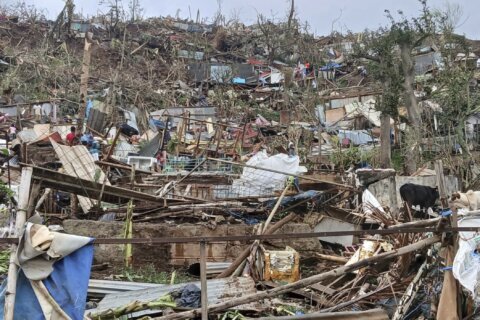ABUJA, Nigeria (AP) — Weeks of flooding have killed nearly 200 people in Nigeria and washed away homes and farmlands, the country’s disaster management agency said, further threatening food supplies, especially in the hard-hit northern region.
The floods blamed on poor infrastructure and badly maintained dams have killed 185 people and displaced 208,000 in 28 of Nigeria’s 36 states, the National Emergency Management Agency said in an update Friday, triggering frantic efforts to evacuate hundreds of thousands to makeshift shelters.
Nigeria records flooding every year mostly as a result of failure to follow environmental guidelines and inadequate infrastructure. The worst floods the country has seen in a decade were in 2022 when more than 600 people were killed and over 1 million displaced.
However, unlike in 2022 when the floods were blamed on heavier rainfall, the Nigerian Meteorological Agency predicted delayed or normal rains in most parts of the country this year and said the current floods were more a result of human activities.
“What we are doing is causing this climate change so there is a shift from the normal,” said Ibrahim Wasiu Adeniyi, head of the central forecasting unit. “We have some who dump refuse indiscriminately, some build houses without approvals along the waterways,” he added.
The Nigeria disaster response agency warned the flooding could get worse in the coming weeks as the flood waters flow downwards to the central and southern states.
“People (in flood-prone areas) need to evacuate now … because we don’t have time any longer,” its spokesperson, Manzo Ezekiel, said.
In Jigawa, the worst-hit state, which has recorded 37 deaths, the impact of the floods has been “devastating” and authorities are converting public buildings and schools as shelters for those displaced, according to Nura Abdullahi, head of emergency services in the state.
The floods have so far destroyed 107,000 hectares of farmland, especially in northern states, among the most affected and where most of Nigeria’s harvests come from.
Many farmers in the region are already unable to farm as much as they would like either because of decreasing inputs as families struggle amid Nigeria’s economic hardship or as a result of violent attacks that have forced them to flee.
As a result, Nigeria has the highest number of hungry people in the world, with 32 million — 10% of the global burden — facing acute hunger in the country, according to the U.N. food agency.
Resident Abdullahi Gummi in Zamfara state’s Gummi council area said the floods destroyed his family’s farmlands which are also their source of income. “We spent around 300,000 naira ($188) on planting, but everything is gone,” Gummi said.
——
Mohammed Ibrahim in Kaduna, Nigeria, contributed.
___
Follow AP’s coverage of climate change at https://apnews.com/climate-and-environment
Copyright © 2024 The Associated Press. All rights reserved. This material may not be published, broadcast, written or redistributed.







